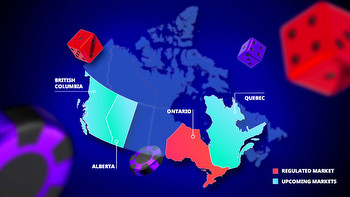Commonly-held beliefs regarding online casinos in Canada

Sponsored: In the quest to understand the complexities of virtual casinos, we explore the common conceptions (and misconceptions) surrounding the online gambling industry
Gambling websites are now more popular than ever, and from the looks of things, they will only get more popular as time goes. Regardless, online gambling is a relatively new phenomenon, especially when compared to its land-based predecessor.
The fact that online casinos are new and unexplored has many people wondering about its place in the gambling industry. In the quest to understand its complexities, people are giving power to myths told about online gambling.
We explore some of the commonly-held beliefs about online gambling, and determine whether or not they are true.
Truth: Online casinos accept cryptocurrency
In 2009, Satoshi Nakamoto completely changed the world of finance when he released the first crypto. Since then, Bitcoin has since grown drastically and become a multi-thousand-dollar investment.
Businesses all over the world are looking into expanding into the crypto market. However, one of the first industries to embrace the crypto market was the iGaming industry. Online casinos have been accepting Bitcoin, Ethereum and Tether for a long time now. It is just part of the reason that crypto-fans are much more likely to gamble online than in person.
Nowadays, crypto gambling is so popular that there are crypto casinos, which are websites dedicated entirely to betting and gambling using cryptocurrency. Even standard internet gambling sites embrace a variety of cryptocurrency, from Bitcoin, Ether and Tether, to Litecoin, Bitcoin Cash and Ripple.
Myth: All online casinos are unsafe
A lot of people are under the misconception that all online casinos are unsafe, just because the unlicensed ones are.
Top-tier, licensed and regulated online casinos take every precaution to ensure a safe and fair gaming environment. If they didn’t, they wouldn’t pass the review by some of the top-tier licensing organizations in the world. What is true, though, is that not all licenses are equivalent.
If a casino has the Ontario license, or a license by one of the many European Union member states, then it is likely safe and reliable. People can and should expect fair odds and detailed security measures.
Truth: Unlicensed casinos are unsafe
Many people believe that unlicensed casinos are harmful and may even be scams, and indeed, that is true. No matter where people are playing from, licensed, highly-rated and regulated online casinos are the safest bet for online gambling,
In Canada, online casinos are legal nation-wide. However, Canadian residents, with the exception of Ontario residents, can only play at licensed offshore gambling websites. There are some excellent rated casino sites for players in Ontario, as the province has recently legalized all forms of online gambling and even issues its own licenses.
Myth: You can’t win real money online
This myth largely stems from misunderstanding certain laws, or simply misunderstanding the online gambling industry as a whole. There are a lot of people who believe that it is impossible to win real money online, because of legal restrictions. However, that is not the case, as there have been quite a few gamblers who’ve won incredible sums online.
The most popular online casino games are slots, and much like their land-based predecessors, online slots are entirely random, negating claims that online casino games are rigged. They function using a random number generator, meaning that every spin will result in a unique and randomized outcome.
Truth: Online gambling in Canada is legalized within Canada
There are a large majority of people who believe that online gambling is legal across Canada. Indeed, residents of the Great White North are free to gamble online. However, the Canadian government, for the most part, has banned online casinos from operating within the nation’s borders.
What does that mean? Well, it means that Canadians, for the most part, have to play at offshore casinos. However, there is an exception to this rule. As previously mentioned, Ontario has legalized online gambling within the province, and even issues licenses to local online casinos. So, while most of Canada has not jumped on the bandwagon, Ontario residents can gamble both locally and internationally.
Myth: Online casinos may increase risk of compulsive gambling compared to land-based casinos
Licensed internet casinos take a lot more steps in mitigating compulsive gambling than most brick-and-mortar casino establishments do. For example, many gambling websites track player activity. If they notice something is off, or a player is spending too much, they contact them and even cut them off by temporarily suspending their account.
A lot of online casinos also participate in self-exclusionary campaigns. In other words, a player can step into contact with an online casino and ask that their account be suspended for a certain amount of time. At which point, the casino will disable said account, and block the user’s IP until the allotted time has passed.
In many ways, many online casinos consider more precautions when it comes to addressing problem gaming habits than their land-based counterparts.
The online gaming industry has grown to generate billions of dollars annually, and many experts believe that it will soon overtake its land-based predecessor. In any case, online casinos are here to stay in Canada.






































